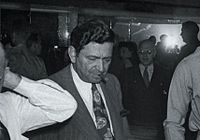





 Nick Dandolos
Nick DandolosNikos "Nick the Greek" Dandolos (Greek: Νίκος Δάνδολος; April 27, 1883 - December 25, 1966) was born in Rethymnon, Crete and was a professional gambler and high roller.
Dandolos was the son of wealthy parents. He attended the Greek Evangelical College and earned a degree in philosophy. When he was 18 years old his grandfather sent him to the U.S.A. with an allowance of $150 per week. Although Dandolos settled down in Chicago he eventually moved to Montreal where he began gambling on horse races.
Dandolos was known throughout his life for winning and losing large sums of money. After winning over $500,000 on horse racing, he moved back to Chicago where he lost it all on card and dice games. He quickly became a master of these games, however, and became a prime attraction at casinos when he would play in them.
From January 1949 to May 1949, Dandolos played a two-person "heads up" poker match against Johnny Moss where the two played virtually every variation of the game that existed at the time. The game, set up by Benny Binion as a tourist attraction, is widely credited as being the inspiration for the modern day World Series of Poker.
At the end of this five-month poker marathon, down an estimated $2-4 million, Dandolos uttered what has become one of the most famous poker quotes ever: "Mr. Moss, I have to let you go."
One urban legend claims that Dandolos once had the opportunity to escort Albert Einstein around Las Vegas. Thinking that his gambling friends may not be familiar with him, Dandolos allegedly introduced Einstein as "Little Al from Princeton" and stated that he "controlled a lot of the numbers action around Jersey." According to Dandolos' own testimony in Gambling Secrets of Nick the Greek, just before the end of World War II, he got a call from a friend at the United States State Department. The caller said that there was someone who was looking for a poker game on a weekend in Manhattan. Dandolos reminded his friend that gambling is illegal in New York, but his friend said that he would see to it that no law enforcement would get involved. At the game, according to Dandolos, he introduced Albert Einstein as "little Al from Jersey."
Another urban legend has him winning one million dollars against a Texan. In the early hours of the morning, Nick felt tired and called an end to the game. The Texan accused him of chickening out while the going was good. Nick the Greek then called for a new deck of cards, shuffled them and asked the Texan if he wanted to cut the cards (high card wins) one time, for double or quit. The Texan declined and they went home.
Nobel Prize-winning physicist Richard Feynman also met Nick the Greek, according to the autobiographical Surely You're Joking, Mr. Feynman!. Nick explains how he wins big not by playing the tables, but by knowing the odds at the tables and betting against others who have superstitious beliefs about the outcome. He then relies on his reputation to bet against others.
In Eliot Asinof's "Eight Men Out" the author attributes this gambling wisdom to Nick the Greek: "Never bet on anything that can talk."
Near the end of his life Dandolos was near-broke and playing $5 limit draw poker games in Gardena, California. When asked by a fellow player how he could once play for millions and now be playing for such small stakes, Dandolos supposedly replied "Hey, it's action, isn't it?"
He died on Christmas Day in 1966 and was a charter inductee of the Poker Hall of Fame in 1979.
It's estimated that he won and lost over $500 million (about $15 billion in today's dollars) in his lifetime. He himself claimed that he went from rags to riches over 73 times. A man who never respected money, he donated over $20 million (about $500 million adjusted for 2009 inflation) to education and charity.
A book by Ted Thackrey was published in 1968 titled Gambling Secrets of Nick the Greek.
A novel about Nick's life was written by Harry Mark Petrakis in 1978 titled Nick the Greek.